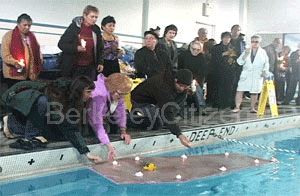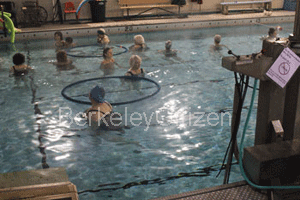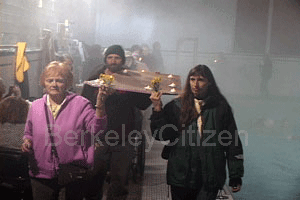
Funeral for Berkeley's Warm Pool
Produced by Berkeley Citizen |
 Funeral for Berkeley's Warm Pool
Funeral for Berkeley's Warm Pool
Berkeley, December 14, 2011
Message from the BERKELEY POOLS CAMPAIGN December 14, 2011
The Warm Pool filled for the last time Wednesday night, as more than 100 pool users and supporters gathered to bid the pool adieu.
A mock coffin was carried into the pool, as participants in the water and on the decks held candles and mourned the loss of the Warm Pool. Wednesday, Dec. 14, was the pool's last day open to the general public; a regularly scheduled Berkeley City College class for the handicapped will be held the following day. Then the pool will be mothballed for several months, with demolition scheduled for June.
Rabbi Sara Shendelman played Tibetan bells and read an interfaith series of prayers, invoking the world's great spiritual traditions. To close the event, longtime Warm Pool swimmer Judi Berzon read a statement from the Berkeley Pools Campaign, of which she is a Steering Committee member:
Welcome to the Warm Pool funeral.
On the eve of the Warm Pool’s scheduled final closure, we are gathering together with great sadness to mourn many losses:
 We mourn the Warm Pool, which has served the disabled, elderly, parents, infants and many others since the mid 1980s.
We mourn the Warm Pool, which has served the disabled, elderly, parents, infants and many others since the mid 1980s.
We mourn the weakening of Berkeley’s leadership on disability rights. By allowing the Warm Pool to close without any real effort to provide or plan for a replacement facility, the City of Berkeley is undermining its longtime status as pioneer of the nationwide movement for the rights of the disabled.
And we mourn for ourselves. The Warm Pool is the only available and affordable form of exercise and therapy for many of us who are disabled. For some, the pool’s loss may be the chronicle of a death foretold. Its disappearance will certainly lead to diminished health for many, and for some it will inevitably lead to premature death. To say this is not melodrama or exaggeration. It is reality.
We urge the City Council to respond quickly to provide Warm Pool alternatives for the short and medium terms. At the same time, we urge the City to begin as soon as possible the planning and research process for a pools bond measure for the November 2012 ballot. Such an initiative would unite the able-bodied and disabled, the young and old, to create a long-lasting legacy in which Berkeley can be justifiably proud.
Berkeley community lost with defeat of Measure C
Robert Collier July 8, 2010
NOTE: Voter turnout was the lowest in Berkeley's history - about 22% - at least since 1975.
Recently, Berkeley lost part of its heritage and its quality of life. Willard Pool, one of the city's four public pools, became the victim of years of deferred maintenance and a budget crisis that is threatening to gut municipal facilities and services all around the Bay Area.
The cause of Willard's closure was the defeat of Measure C, the pools bond measure and parcel tax in the June 8 election, which received 62.2 percent of the vote, just shy of the two-thirds minimum.
While Measure C received overwhelming support throughout Berkeley's middle-income and lower-income flats, it was defeated by a heavy "no" vote in the wealthy hills neighborhoods, where residents complained that the pools were too expensive in hard economic times.
The real cost for Berkeley, however, is the loss of part of our community fabric. Willard Pool gave joy and healthy exercise to South Berkeley children and adults since 1964, but now they must fend for themselves or take a long trek across town to continue swimming. Also scheduled for permanent closure next year is the Warm Pool, which serves the elderly, disabled and young children, and which literally provides a lifeline for many people who otherwise have no opportunity for physical exercise and rehabilitation.
In Oakland, San Francisco and San Jose, the trend is the same — public pools are being padlocked because of budget cuts, leaving children and teenagers out on the streets with fewer healthy alternatives. This summer, two of Oakland's seven pools are closed; two of nine in San Jose are shut; all of San Francisco's nine pools are closed one day per week.
The problem is likely to get markedly worse in the coming year unless voters are willing to support new taxes to offset the cascading domino effect of budget cuts in Washington, Sacramento and individual city governments. Congress has abandoned legislation that was to provide $24 billion in aid to the states, prompting Sacramento officials to warn that funding cuts to cities will be deeper than expected.
In Berkeley, City Manager Phil Kamlarz has said that despite the recent renegotiation of contracts with city labor unions to avoid layoffs, the city will need to make further cuts at the end of the year once the impact of state cutbacks becomes clear.
Many cities are readying parcel taxes for the November ballot to keep services alive. For example, Oakland will vote on a parcel tax for police, and Berkeley will have a schools bond and parcel tax. If these fail, catastrophic layoffs will result.
There are red flags galore. The defeat of Alameda's schools parcel tax by a razor-thin margin, with 65.6 percent of the vote, will force the closure of one-half of that city's schools. This should have every Bay Area community scared witless.
Because of Prop. 13, all municipal bond measures (which pay for bricks-and-mortar construction expenses) and parcel taxes (which fund annual operating costs) require a minimum of two-thirds of votes cast. The only exception is school district bond measures, which require 55 percent.
The two-thirds minimum is especially hard to achieve because municipal campaigns typically are run by average residents rather than political professionals.
Residents volunteering for these all-out, grass-roots efforts must steal time from their families and day jobs. In the case of Berkeley's Measure C, for which I was a co-chairman, our group of local swimmers, parents and other pools supporters was taxed to our individual maximums — and beyond — by the monumental task of trying to gain support from two-thirds of all voters throughout the city.
As we worked late into the night after our spouses and children had gone to sleep, many of us wondered not a few times whether there wasn't a better way for a city to make its decisions.
But this is the bleak future for all of us. Attempts in Sacramento to reform Prop. 13's two-thirds rule have gone nowhere and seem likely to continue to fail. As a result, if we want to save our pools, schools, police and other basic services, we must be ready to organize, vote, and invest in the future of our communities.
Berkeley Citizen © 2003
All Rights Reserved
All Rights Reserved
 Funeral for Berkeley's Warm Pool Berkeley
Funeral for Berkeley's Warm Pool Berkeley